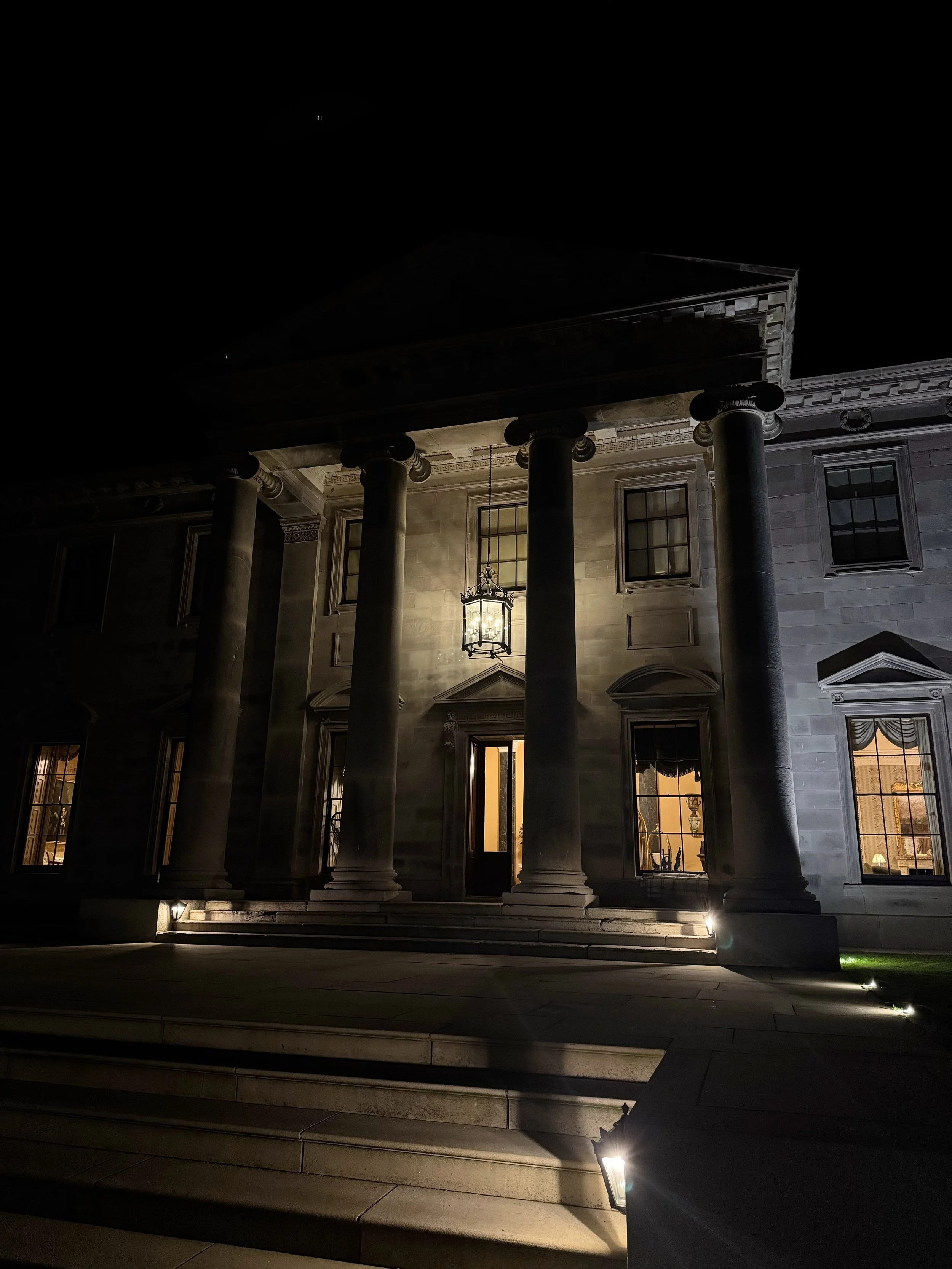There’s something about the Irish countryside at dusk — that moment just before night folds in upon you, when everything feels suspended between stillness + the mystery of yet-to-be-discovered stories; especially when it’s date night at Ballyfin. We left Kildare as the sky began to soften, the 50-minute drive just long enough to let the day dissolve into something slower. By the time we turned into Ballyfin’s gates, the world had hushed entirely.
An inaugural visit for us both, the estate reveals itself gradually — the lake glimmering beyond the trees, the grand façade of the house emerging like a secret you’re being let in on. There’s a sense of exclusivity to Ballyfin that doesn’t feel pretentious, just quietly assured. And while we weren’t checking in for an overnight, perhaps that’s what makes even simply dining there feel so special: you’re not merely going out for dinner, you’re stepping into a chapter of Irish history.
Inside, time seems to stretch you back to a grander era. Gilded mirrors, sweeping staircases, the kind of art + architecture that even in their unshakable presence, whisper rather than declare. We were shown around at first + enjoyed a beautiful cocktail by the fire before being taken to our table in the State Dining Room, where candlelight reflected off the polished mahogany + golden frames — a setting that could easily have overwhelmed, yet somehow didn’t. Everything at Ballyfin feels curated to a calm hum.
Dinner unfolded at an unhurried pace — each course beautifully balanced, elegant without over-rehearsal or complication. Irish produce given its due respect: earthy, refined, deeply satisfying.
It’s worth pausing for a moment on what was on the table + who’s pulling the strings behind it. The kitchen at Ballyfin is led by Richard Picard-Edwards, who joined the estate in April 2023, bringing with him a background in Michelin-starred kitchens in the UK. Under his hand, the menu leans into seasonal Irish ingredients — some of which come straight from Ballyfin’s own walled kitchen gardens — while retaining a classical, refined technique. What made the evening even more special was how the setting + service echoed the cuisine. We weren’t rushed; the pace allowed us to savour the food, the table, the conversation. That sense of “guest” rather than “diner” was everywhere — even in the simplest of touches, like the way the staff described the provenance of the butter on our table (from a Cork farm). In short, the meal felt like a carefully crafted narrative of this place — the house, the gardens, the land, the kitchen. It felt like more than “just dinner.”
After our dining experience, we found ourselves chatting with John, the night porter, who has been part of Ballyfin’s chronicles since the very beginning of its current rendition (if I remember correctly, 28 years). He told us how the house, once a private residence built in the 1820s for Sir Charles Coote, later became a Patrician Brothers’ school before being lovingly restored to its former grandeur by American owners Fred + Kay Krehbiel, who poured their hearts + souls into ensuring every detail was executed with perfect precision. John spoke with a beautiful sort of quiet pride — not the kind of overly rehearsed hospitality you often meet in equally exclusive hotels, but that gentle, genuine Irish storytelling that invites you in for a chat. He told us of the restoration that took nearly a decade, of the treasures discovered behind plaster walls, + of the Krehbiels’ deep love for preserving not just the house, but its spirit. His words made the walls feel alive — history layered with care, not performance or polish.
Later, as we stepped outside into the night, the façade of Ballyfin glowed in the soft amber of the lanterns. The lake shimmered in the distance, + for a moment, I felt suspended in time — between the glow of having had such an exquisite evening + the desire for it to last through the night. It was the kind of evening that reminds you why connection — to place, to history, to each other — really matters.
There was a sweetness to the simplicity of it all: just 50 minutes from home (just over an hour if travelling from Dublin), yet it felt as though we’d travelled far beyond the ordinary. Driving back through the quiet countryside, I couldn’t help but feel that Ballyfin doesn’t just host you — it holds you, for a moment, inside its story. + with that, you hold it forever a little too.
Discover more at — BALLYFIN.COM














